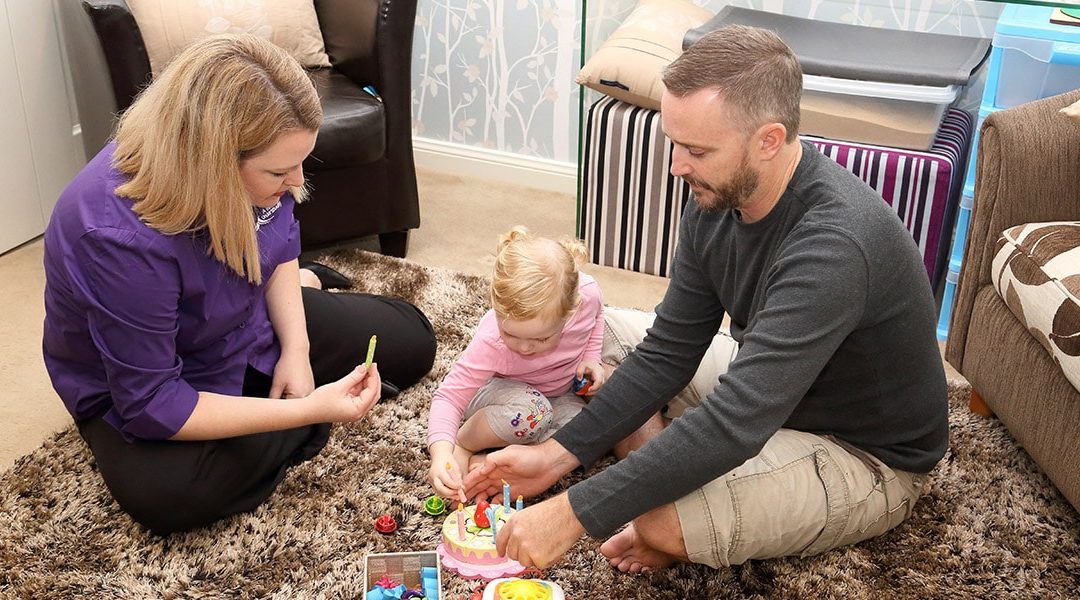As many of you will know, the beginning of the therapy process can be an incredibly challenging and overwhelming process.
Once you have gone through the stage of realising that your child needs additional help in developing speech and language skills, organising and then attending an assessment session and finding out the results, you can often feel as if you have entered a new and unfamiliar realm!!
Then comes the prospect of being told that therapy/intervention is required to help your child to further develop speech and language skills. Many of you may be unsure of your role in this new venture and some will believe that you do not have the appropriate skills to participate in therapy. Many of you will underestimate how vital your presence and participation is to achieve positive outcomes. However, let me reassure you, that all of you, as parents, have skills and knowledge that makes you a vital contributor in the therapy process. I should mention, that therapy itself should be a straight-forward process, particularly if you are working with a skilled clinician, who will guide you and explain every step of the way!
Research conducted on the importance of parent involvement indicates that parents bring the following to therapy:
-
-
- First hand and expert knowledge of their child, which they can use to ensure that practice is effective and fun. Parents have the skills and abilities to follow their child’s lead in play and other appropriate activities
- A high level of motivation to help their child and as a result often a high level of enthusiasm to participate in therapy
- Willingness to learn best methods and techniques to develop a child’s speech and language skills
- Opportunity to practice on a daily basis (and sometimes several times per day!!!)
- The ability to use every-day situations to practice skills and in doing so, increase the generalisation of skills
-
As many of you will appreciate, the more practice performed, the better the chance of positive change! However, there is more good news – when parents participate in therapy, research has also indicated that the stress levels of both parents and children is decreased due to the increased skills and knowledge in both.
However, some of you may approach therapy with some unrealistic expectations:
-
-
- The Speech Pathologist/clinician will perform all the ‘therapy’ tasks and parents are passive observers
** We are happy to say that everyone participates in therapy at the Well Said Clinic. There is no sitting on the couch and playing on your mobile phone!! - Attendance at Clinic will result in change and there is no need to perform any additional practice
** Again, the truth is, that regular practice in every-day situations is a necessary element of therapy. Regular practice helps your child to acquire new skills and abilities so that they become familiar and habit forming. Progress cannot be achieved by only attending the clinic - Regular attendance is not really necessary
** Yes it is!! Whilst we do not believe that weekly therapy is usually required (you and your child need time to practice skills and to make change), regular therapy is still necessary. You will discuss the frequency of therapy with your clinician and there are many factors that contribute to how frequently you need to come and have a session.
- The Speech Pathologist/clinician will perform all the ‘therapy’ tasks and parents are passive observers
-
The best ways to participate in therapy is to see yourself as part of a team – working with your clinician to come up with the goals and activities that you can use on a daily basis. This will make an enormous difference in helping your child to learn new speech and language skills. Activities such as washing the clothes, bath time, walking to the park and driving in the car can all be learning opportunities to practice speech and language skills. Additionally, you are in the best position to report on progress being made, activities that do or do not work as well as planning next steps in therapy!
Remember, your clinician is someone you can rely on to work with you, as a part of a team. Your knowledge of your child, combined with the clinician’s skills and expertise in speech and language development is the best recipe to gain positive and lifelong outcomes.
Lisa Decker
References
- DeVeney, S. L., Hagaman, J. L. & Bjornsen, A. L. (2017). Parent-implemented versus clinician-directed interventions for late-talking toddlers: A systematic review of the literature. Communication Disorders Quarterly, 1-10.
- Rakap, S. & Rakap, S. (2014). Parent-implemented naturalistic language interventions for young children with disabilities: A systematic review of single-subject experimental designs. Educational Research Review, 13, 35-51.
- Roberts, M., & Kaiser, A. (2011). The Effectiveness of Parent-Implemented Language Intervention: A Meta-Analysis. American Journal of Speech-Language Pathology, 20, 180–199.

